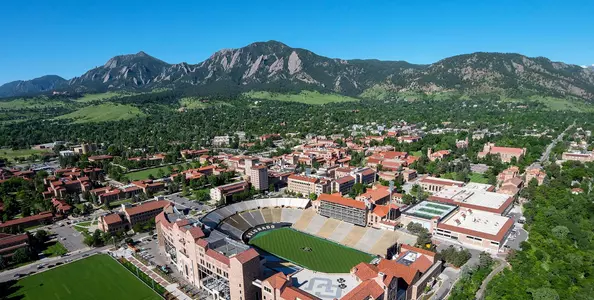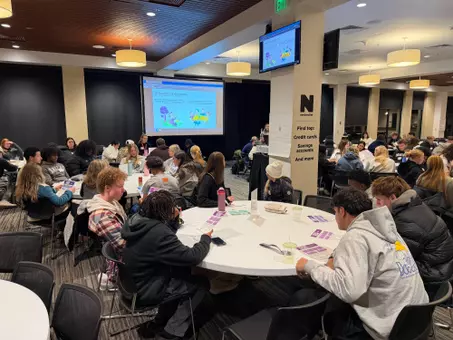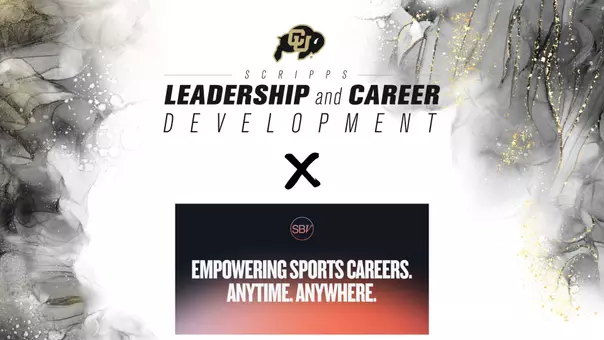Colorado University Athletics

Athletic Department Update
April 26, 2019 | General, Herbst Academic Center, Performance Nutrition, Scripps Leadership & Career Development , Psychological Health & Performance
Learn About Our Mental Health, Safety, Academic, Performance and Nutrition Programs
With the 2018-19 academic year coming to a close, I wanted to take this opportunity to share with you several of our programs and initiatives we have undertaken in the athletic department. These are in the areas of mental health, student-athlete safety, academics, health, performance and nutrition.
We are at the forefront of many of these initiatives, and we are excited about expanding on these initiatives in the future.
Psychological Health & Performance (PHP)
The mission of CU's PHP contributes to overall student-athlete health and performance by inspiring student-athletes to succeed academically, athletically and personally. This is accomplished through individual, group, and team interactions that encourage psychological health while challenging personal growth.
Seven years ago, we hired a clinical psychologist in athletics; we were one of the first to do so, and in recent years this program has expanded to be one of the top mental health programs in the nation – something we are extremely engaged in and proud of. There are now two full-time staff members on staff and we are looking to expand in the near future. The staff coordinates the following:
- Clinical Service Provision: Our counselors see approximately 30-40 student-athletes a week, depending on the time of year, as that number often fluctuates in either direction; we work to get those who request counseling in within 24 hours (and usually sooner). Approximately 75-80 percent of student-athletes take advantage of this service during their time at CU. We consult with athletic trainers, strength & conditioning coaches, sport coaches, administrators, academic staff and dietitians to provide well-rounded support for our student-athletes.
- Bolder Buffs: We have at least one representative from each CU team in the Bolder Buffs group (the total is approximately 25 student-athletes). The group was created by our student-athletes to discuss and support mental health issues that arise amongst their own, hold meetings once a month and have trainings over the summer. We also have launched a series of educational materials as an initiative in the area of coach education.
- Newsletter: The staff produces via Email (PDF) the Mental Health Monthly – a topic-based newsletter for student-athletes, staff, and coaches.
- Partnerships: We have partnerships with the National Mental Health Innovation Center for virtual reality headsets for relaxation and meditation, and with CU's School of Medicine Pre-Doctoral Internship Program that will place an intern (psychology trainee) in our office.
Four areas in our department comprise our Health and Performance initiative: Psychological Health and Performance (PHP), Strength and Conditioning, Performance Nutrition and Sports Medicine. Information is collected and shared among all four groups to create a "Buff Profile" on each student-athlete, with that profile updated twice annually to track changes.
Psychological Health and Performance
- In addition to the above, PHP coordinates with the student-athletes to do a number of baseline surveys when they first come onto campus. Specific screens are reintroduced throughout their careers, including but not limited to anxiety, depression and general well-being.
- A Mental Health Profile (MHP) is created based on screen results. Injury data and MHP are run through an analytics platform to look for correlations.
- Implementing a "Telemedicine" portal, where student-athletes would be able to have appointments with psychiatrists (it is historically difficult to see a psychiatrist in town).
-
Two certified full-time dietitians on the CU athletic staff work closely with every student-athlete on an individual basis.
-
Comprehensive anthropometric data collected throughout the year, changes are tracked.
-
There are 12 full-time, certified athletic trainers on staff (approximately a 30:1 athlete-to-trainer ratio).
-
There are three primary care physicians who work out of CU's sports medicine center every day of the week, and we also have access to physicians and specialists in practically every field of medicine through the Anschutz Medical Campus in Aurora.
-
Strength coaches for each program start every year off by creating a high performance calendar, where phases of training are plotted out along with rest periods and testing dates. Testing usually happens twice a year. Growth and improvements are measured and training programs evaluated.
-
During the season, athletes are monitored with various technologies to determine and promote readiness. Various tools and technologies are used to accommodate student-athletes limitations during training sessions keeping them safe and promoting growth.
We have had several of our staff members engage in research projects. One is the Pac-12 Conference's Care Associate Program, where all member schools are participating in a national research project to collect specific data points about concussions (symptoms, timeline, injury demographics). Pac-12 schools will be using special technology that only a few other schools will be using, including technology that measures eye movement and tracking which will give a better idea of what is going on with the brain.
For the past five years, we have been participating in the WAVI/CU Project. We have been working with a local company to measure brain waves of our student-athletes; baseline measurements are taken of all those who participate in football and women's soccer. Measurements are then taken after concussion and again when the student-athlete is cleared to return. This is the only direct measurement of the brain and therefore a valuable project, with longitudinal results being summarized and data submitted for publication.
Complete follow-ups are performed on the baseline mental health assessments, and screens are done throughout the athlete's career and after any concussion. All athletes who suffer concussions are required to meet with and be monitored by our psychologists.
Student-Athlete Safety & Well-Being Projects
In addition to these ongoing studies, we are very pleased to be associated with two research grants announced this week by the Pac-12. The conference's Student-Athlete Health and Well-Being Initiative's grant program has invested more than $12 million since its founding to study important health issues. For the upcoming school year, CU will lead these two studies. We are partnering with Dr. Theresa Hernandez (CU Boulder), Dr. Matthew McQueen (CU Boulder) and Dr. Christopher Yakacki (CU Boulder & Denver) on two unique projects:
Summary: This study seeks to find whether there are mental health and chronic condition differences among former student-athletes and alumni from the general student body. In collecting and using data from former student-athletes to inform current best practices, this study will assess longitudinal patterns of physical and psychological health while paying attention to the presence of chronic conditions (e.g., diabetes, heart disease, obesity, neurodegenerative diseases, etc.) and mental health diagnoses in student-athlete alumni compared to cohort matched student non-athlete alumni. The research will also aim to build upon previous related research by assessing socioeconomic and first-generation status as group profiles, as well as modifying factors of student-athlete health following their collegiate careers. We hope to use this data to better optimize the overall health and well-being of current and future student-athletes. Our Athletics staff will work closely with CU Boulder's integrative physiology faculty on this study.
Summary: Current football helmet research aims to lower the severity of impacts and reduce the prevalence of concussions in the sport. Recently, the NFL released several computer models of helmets to investigate the influence of helmet materials and designs on head impacts. This study, led by CU Denver Associate Professor Chris Yakacki, seeks to leverage this state-of-the-art technology and create new models to improve helmet safety using a recently developed high-performance polymer called liquid-crystal elastomers (LCEs). The LCEs will be incorporated in the helmet models and virtually tested to optimize their design. This approach will allow the investigators to rapidly test and evaluate the performance of new materials in helmets, without having to manufacture and physically validate each new configuration.
Performance Nutrition
The goals of CU's Performance Nutrition Department are:
-
Provide Food Coaching: Educate student-athletes to utilize whole foods (minimizing artificial sweeteners, flavors, colors, and prepackaged foods) in their fueling plan to replenish and repair their bodies during challenging training periods.
-
Inspire Excellence: Enable and empower athletes to achieve optimal performance & health through sound nutrition practices in training, competition and life after college.
-
Act with Integrity: Provide advanced and progressive evidence-based nutrition services while maintaining professional ethics.
-
Engage Nationally: Be a leader within the field of sports dietetics and foster collaboration amongst sports dietitians within the Pac-12 Conference and across the NCAA.
We believe in "performance starts with food." Fueling Stations are open Monday through Friday in the mornings and afternoons in both the Champions Center and CU Events Center, with the hours of operation designed specifically to work around the student-athletes' training schedules. At one time or another, almost every one of our student-athletes utilizes these stations on a daily basis. We also utilize a Gold Card program, which is designed to support the fueling needs of our off-campus student-athletes outside of training times. Each week the Gold Card provides student-athletes with $44 that can only be used for food at 35 locations around Boulder, including grocery stores and restaurants.
All 17 CU intercollegiate athletic programs have a "High Performance Nutrition Plan" (HPNP), outlining the services that are provided over the course of a year, with in-season, preseason and off-season goals in mind. A typical HPNP includes one-on-one nutrition and fueling coaching and medical nutrition therapy; team/group education sessions; body composition analysis and anthropometrics (three times a year); and hydration testing and sweat analysis.
There is also a Student-Athlete Wellness Team (SAWT), an interdisciplinary team with sports medicine physicians, athletics trainers, and performance and mental health staff. SAWT meets weekly to identify, monitor and intervene with at-risk athletes, develop protocols for Relative Energy Deficiency in Sport (RED-S), low bone mineral density and amenorrhea.
In 2014, the Performance Nutrition Department in athletics received a grant from the CU Environmental Center to fund the Sustainable Snacks Program. The goals of this program are to provide healthy, high quality snacks at the fueling stations, significantly decreasing the money spent on excessive pre-packaged snacks, and eliminate additives and preservatives found in prepared dehydrated snacks.
The program also educates student-athletes, coaches and staff about sustainable food choices, how to produce minimal food waste, and how to prepare healthy treats, involve and educate the larger student body, and ultimately the community in the development of preparing sustainable food. Athletics has hosted 15 interns from the Environmental Studies Program receiving academic credit for their work since the spring 2016 semester; recently, one of those interns was able to implement composting through research and education, with the fueling station kitchens diverting on average 35 pounds of food scrap per day.
Academic Support
The Herbst Academic Center (HAC) is our premier academic support unit for our 350-plus student-athletes. The staff provides an unparalleled level of service in an inclusive community, defined by ethical excellence in the areas of good academic standing, retention and graduation rates. Support services include the following amongst a myriad of programs:
-
Academic Coordinating: All student-athletes have a designated academic coordinator in the Herbst Academic Center with whom they meet with regularly.
-
Individual Academic Plans (IAP): Every student-athlete has an IAP, which is a "living document" that reflects the student's strengths, points of development, and progress over the course of their academic experience. The IAP outlines specific areas of support including the frequency of academic coordinator, mentor, subject tutor, and faculty meetings during the course of the semester as well as required study hall hours. This document also records and reflects a student's progress toward developmental benchmarks that help them become independent and successful learners. Additionally, the IAP helps direct the student toward enrichment opportunities in the areas of internships, research opportunities, and career development.
-
Mentoring Program: Roughly one-third of our student-athletes meet with an academic mentor one-on-one, once or twice a week, to learn to organize time and priorities, learn study skills and create and review weekly academic objectives.
-
Tutoring Program: Ninety percent of our student-athletes take advantage of the HAC's subject tutoring (at no cost to the student), and all tutoring appointments take place in the Dal Ward Athletic Center.
-
Other services include supervised study halls, coordinating text book loans and the Summer Bridge Program (which eases the transition from high school to college).
-
In our most recent semester report, the cumulative grade point average for our student athletes was 3.005, our highest on record (the first time over 3.0); it was 2.991 for the fall 2018 semester term. Twelve of 15 teams (indoor and outdoor track count as one) have grade points over 3.0, another record. And our most recent graduation data, for those scholarship student-athletes that entered as freshmen in 2012-13, the graduation rate was 91 percent (49 of 54).
Scripps Leadership & Career Development Program (LCDP)
The LCDP provides opportunities, insights and strategies to help develop skills necessary for student-athletes to become effective leaders on their team, on campus and in the community.
Career Development provides student-athletes strategic and intentional programming and opportunities for student-athletes to explore a myriad of career paths and to develop their own professional network to help them succeed beyond CU.
It also provides student-athletes with different programs and opportunities to prepare for life after their CU athletic career. Over the past 12 months, LCDP hosted 11 events, including:
-
Lunch with a Buff: Each month, industry leaders join our student-athletes for an informal, informational interview, providing student-athletes a behind the scenes glimpse at different career paths;
-
Buffs to Biz: A three-day multifaceted event with a career fair featuring companies like Arrow, Google, Pepsi, Western Digital and Yelp!, along with office hours hosted by different industry professionals offering insight into interviewing, resume best practice, etc.;
-
Speed Networking Nights: These break the traditional career fair mold to spur more engaging conversation between industry professionals and student-athletes;
-
InXBuffs: This is a brand new career platform created for student-athletes by student-athletes. This platform provides both current and former CU student-athletes, and the CU Athletics community, with direct access to a national career site. Here, employers can post full and part time internships, job shadowing experiences, and full time positions, in a convenient and one-stop location for student-athletes. InXBuffs aims to help student-athletes build their professional network, and find positions that will help them succeed in life beyond CU while connecting them with local and national employers.
Often all you hear about when it comes to athletics are wins and losses. I truly hope the above gives you some insight into just how committed we are to the well-being of our student-athletes, both in the past, present, and as we look to the future.
Collaboration and Unity,
Rick George
Athletic Director





